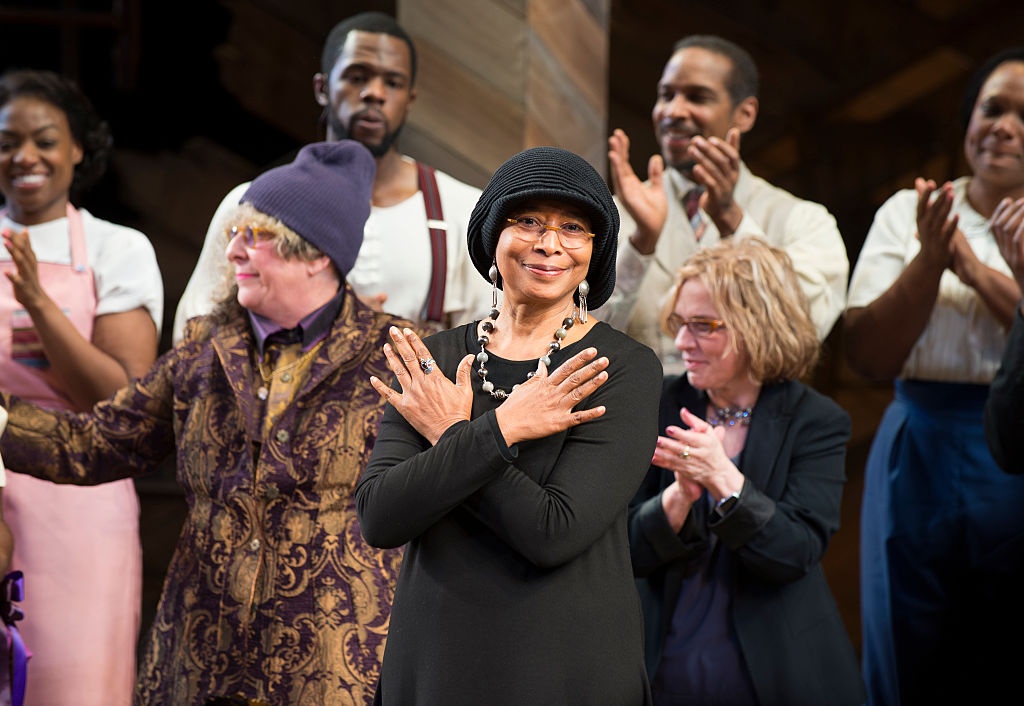
Source: Jenny Anderson / Getty
Earlier this month, we wrote about British actress Oluwaseyi (Seyi) Omooba. Omooba was set to play the lead role of Celie in a revival of play The Color Purple.
But homophobic comments from Omooba’s Facebook page from 2014 surfaced. Omooba stated that she didn’t believe people were born gay and expressed that homosexuality was a sin. As a result, the theater company decided that Omooba wouldn’t be the best fit, especially given the fact that Celie’s character arc involves her attraction and love of another woman.
As we reported earlier, after being dismissed from the role, Omooba hired legal representation to sue the company for dismissing her from the production.
Since then, someone had the chance to speak to Alice Walker, author of the book on which the play is based, about Omooba’s comments.
According to Shadow and Act, first, Walker explained how the character of Celie was based on the experiences of her grandmother.
“It is safe to say, after a frightful life serving and obeying abusive men, who raped in place of ‘making love,’ my grandmother, like Celie, was not attracted to men. She was, in fact, very drawn to my grandfather’s lover, a beautiful woman who was kind to her, the only grown person who ever seemed to notice how remarkable and creative she was. In giving Celie the love of this woman, in every way love can be expressed, I was clear in my intention to demonstrate that she too, like all of us, deserved to be seen, appreciated, and deeply loved by someone who saw her as whole and worthy.”
Then she address Omooba specifically and how her beliefs would have effected her portrayal of Celie.
“Playing the role of Celie while not believing in her right to be loved, or to express her love in any way she chooses, would be a betrayal of women’s right to be free. As an elder, I urge all of us to think carefully about what I am saying, even as you, Oluwaseyi Omooba, sue the theatre company for voiding your contract.”
Alice Walker famously–depending on who you ask–dated singer Tracy Chapman in the nineties, decades after divorcing her husband and father of her daughter, in 1976. In a 2006 interview, with The Guardian, Walker spoke about the relationship with her interviewer.
“I tell her people are still fascinated by her love affair with the singer Tracy Chapman in the mid-1990s. Moments earlier she had said firmly but politely that she didn’t want to answer any questions about her family life. (Her daughter Rebecca, from her marriage to Levanthal, published a frank memoir in 2000 in which she criticised the self-absorption of both parents after their divorce.) So I was surprised to see her face light up at the mention of Chapman. “Yeah I loved it too. Absolutely.”
Why was it kept so quiet at the time? “It was quiet to you maybe but that’s because you didn’t live in our area,” she answers with a throaty laugh. She has written about the relationship in her journals, which she plans to publish one day. So why did they decide against using their relationship to make a big social impact like other celebrity lesbian couples, such as Ellen DeGeneres and Anne Heche, have in the past? The idea seems to amuse her. “I would never do that. My life is not to be somebody else’s impact – you know what I mean? And it was delicious and lovely and wonderful and I totally enjoyed it and I was completely in love with her but it was not anybody’s business but ours.”









